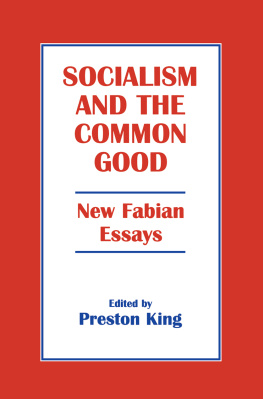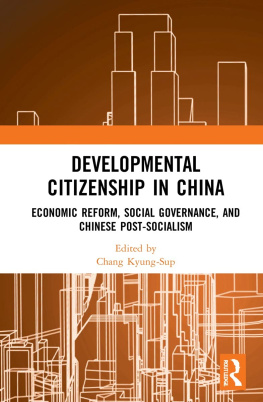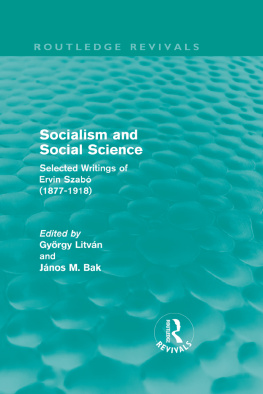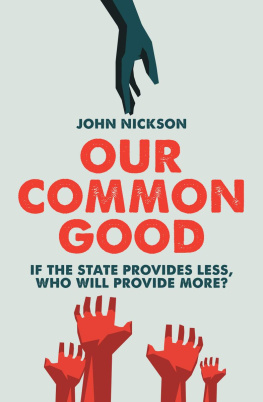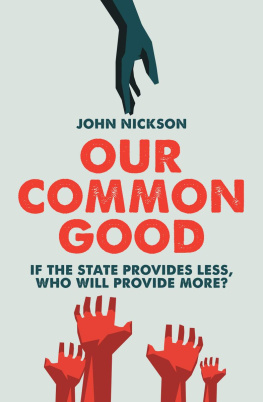SOCIALISM AND THE COMMON GOOD
SOCIALISM AND THE COMMON GOOD
New Fabian Essays
Edited by
PRESTON KING
First published 1996
by FRANK CASS & CO. LTD.
Published 2013 by Routledge
2 Park Square, Milton Park, Abingdon, Oxon OX14 4RN
711 Third Avenue, New York, NY, 10017, USA
Routledge is an imprint of the Taylor & Francis Group, an informa business
1996 Preston King
British Library Cataloguing in Publication Data
Socialism and the Common Good: New Fabian Essays
I. King, Preston
320.531
Library of Congress Cataloging-in-Publication Data
Socialism and the common good : new fabian essays / edited by Preston King.
p. cm.
Includes bibliographical references and index.
1. Socialism. 2. State, The. 3. Collectivism. I. King, Preston T., 1936.
HX73.S617 1996
335.14dc20
95-24863
CIP
ISBN 13: 978-0-714-64655-8 (hbk)
ISBN 13: 978-0-714-64255-0 (pbk)
All rights reserved. No part of this publication may be reproduced in any form, or by any means, electronic, mechanical, photocopying, recording, or otherwise, without the prior permission of the publisher.
Typeset by Vitaset, Paddock Wood, Kent
Contents
Anthony Arblaster
Leslie Macfarlane
Preston King
Brian Barry
David Winter
Raymond Plant
Martin Hollis
Iain Hampsher-Monk
G. A. Cohen
Bhiku Parekh
Onora ONeill
ANTHONY ARBLASTER, Reader, Department of Political Theory & Institutions, University of Sheffield
BRIAN BARRY, Professor of Political Science, London School of Economics
G. A. COHEN, Chichele Professor of Social & Political Theory, University of Oxford
IAIN HAMPSHER-MONK, Reader, Department of Politics, University of Exeter
MARTIN HOLLIS, Professor of Philosophy, University of East Anglia
PRESTON KING, Professor of Political Philosophy, Lancaster University
LESLIE MACFARLANE, Fellow, St Johns College, University of Oxford
ONORA ONEILL, Principal, Newnham College, University of Cambridge
BHIKHU PAREKH, Professor of Political Theory, University of Hull
RAYMOND PLANT, Master, St Catherines College, Oxford
DAVID WINTER, Reader, Department of Economics, University of Bristol
This book brings together a set of writings by some of the leading social and political thinkers at work in Britain today. Its object is to place before the public some seminal discussions of what is largely a single theoretical issue, together with its practical ramifications: the role of the state, from a socialist perspective, in achieving the common good, or social justice, in modern market systems.
These essays raise many questions. Is state ownership essential to the common good, or is it only one among other theoretically feasible means of securing social justice? Is state ownership an exclusively socialist project, or is it equally a characteristic of conservative policy, in conditions of electoral competition and majority rule? Can a rationalist and egoistic contractualism serve as an adequate model for modern society, or is it at bottom descriptively inept and morally anaemic? Is communitarianism a threat to civil liberty in social democratic states, or is it a necessary condition for efficacy and fairness? How far should the citizens community of allegiance extend? Up to the borders of his/her class? Nation? State? Beyond? And on what grounds? The authors of these essays reflect a variety of responses: they follow no single line. But they are remarkably uniform in their rejection of the cult of choice and of rational egoism, and in their promotion of a more robust and inclusive notion of community and of social responsibility.
It is commonly claimed that socialism is one or a set of social movements that basically originated in a positive concern to promote the common ownership of property. It is not so commonly recognised that it arose from something simpler and more negative: repudiation of the character and consequences of monopolistic private ownership and control. Where socialism is identified with the positive quest for common ownership, the question that arises is whether the theorem of public ownership can only be legitimately satisfied by direct and active state control, or equally legitimately by various less-engaged forms of arms-length, state regulation. A parallel question that arises is whether common ownership is better read as a part of the meaning of social justice, or by contrast as only one among other theoretically possible means to achieving the common good. This debate has been sharpened by the extraordinary celebration of market principles which has largely meant both protecting and deepening the inequities of the market since the first Thatcher government in 1979, and the first Reagan administration in 1980.
There are some who place the very highest value upon egalitarian community upon strong individual identity grounded in a rough equality of social, economic and political condition. By contrast, many of the same individuals contend that common ownership, as a means to such a community, issues in state monopoly; and they conclude that this, if too encompassing, is not only inefficient, but also undermines the very equality of condition which common ownership was originally intended to secure. The historical record is rather complex for, while many socialists have been strong advocates of state ownership, many others (such as P.-J. Proudhon and Eduard Bernstein) have firmly promoted forms of private ownership. What is reflected in this volume is the importance both of community and individuality, and of the need for a better balance between them in the interest of the common good and social justice.
Most of these essays were discussed by members of the Socialist Philosophy Group (SPG) of the Fabian Society in the period since 1990, either in their original or in modified form. Over half of them are entirely new and are published here for the first time, including the three opening chapters of have not been published hitherto. All of the authors, save one (Plant), have been cumulatively involved in some or all of these discussions, and most of the paper-writers have been influenced in some degree and fashion by the positions staked out by their colleagues and friends. The writers have been guided by no brief, but their essays do seem to establish a pretty coherent, but of course, pluralistic, coherence.
I take this opportunity to thank collectively the contributors, both for their essays, and for the re-direction of the royalties from these to the Fabian Society, which has sponsored and promoted this volume. Thanks are due to Simon Crine and to Giles Wright of the society for the support they have given throughout for the SPG meetings in Dartmouth Street and elsewhere. I should also like to note the helpful contributions of among many others Tony Beck, Geoffrey Bindman, John Carrier, John Champneys, Robin Cohen, Diana Coole, Nicholas Deakin, G. M. Dillon, David Donnison, James Doyle, Barbara Goodwin, Roger Hadley, Patricia Hewitt, Patricia Hollis, Paul Hirst, Ann Holmes, Sally Jenkinson, Ian Kendall, Kelvin Knight, R. D. McKinlay, Charles Marquand, David Marquand, Liam OSullivan, Anne Phillips, Alan Playdell, Margherita Rendel, L. J. Sharpe, Raewyn Stone, Sally Tomlinson and Peter Wilkin.
Preston King

